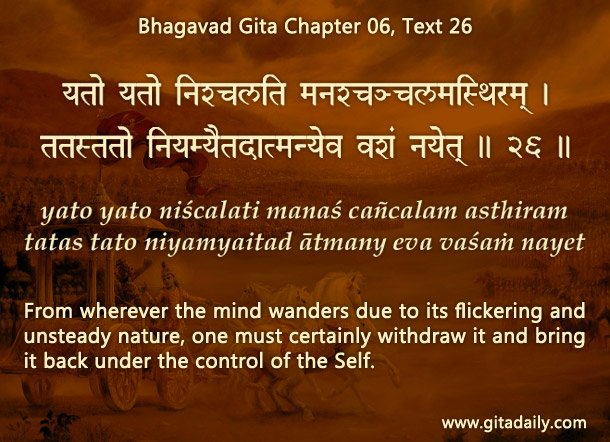Whenever we are trying to meditate on Krishna, we may often be challenged by our mind’s wandering here and there. In the Bhagavad-gita (6.26), Krishna anticipates such wandering and urges us to patiently and persistently bring the mind back to refocus on Krishna, the Supreme Self. Struggling to Concentrate
While we are trying to regain such focus, one common problem may be distraction. A solution to distraction is concentration, wherein we put in greater efforts to pull the mind back to Krishna from wherever it has gone. Sometimes such an effort works, and sometimes it doesn’t. When it doesn’t work, we may well berate ourselves for not having the will to refocus our mind. But that might be short-sighted and counterproductive.
It is short-sighted because the problem might actually not be a matter of will, but a matter of wisdom—of the inability to see beyond the symptom to the actual cause. Sometimes the mind’s deviations go no further than distraction. Sometimes they go much further to downright distortion, wherein the mind starts perverting and inverting our inner perception so that we actually start thinking of worldly things as not just more enjoyable than Krishna, but also more consequential and valuable than Krishna.
An explicit articulation of such inverted perception exposes its falsity and absurdity quite easily to anyone who is philosophically-minded. The problem, however, is that the mind frequently does not allow such explicit articulation. It works subtly and sinisterly so that we buy into its beliefs: its conceptions, its propositions, and ultimately its distortions — specifically, in the case of our struggle to focus, the notion that whatever it is being distracted to, matters more than what we want to concentrate on. At such times, if we just keep endeavoring with greater force or concentration, we will be only fighting against the symptoms without even enquiring about the disease, leave alone treating it. Our inevitable failure in this fight will further discourage us and may even lead us to self-loathing — all of which will be counterproductive.
Instead of struggling for concentration, we need to strive for clarification and correction. We can take a pause, take a few deep breaths, and have an inner dialogue with our mind. Let the mind have its say about what it is so worked up about, and once it has vented itself, we can address its concerns calmly, clearly, cogently — just as we would try to reassure a child who is excessively disturbed by some triviality. Such an effort at an inner conversation may not necessarily calm or convince the mind, but the effort at explicit articulation of the concerns and their solutions will calm and convince us to not let the mind take over control of our decision-making.
The resulting conscious correction of our inner priorities, which were distorted by our mind, will give a deeper foundation and stronger conviction for our efforts to refocus our mind on the one reality that ultimately matters the most: Krishna.
Summary
- Whenever we are unable to focus, if the problem is just distraction caused by the mind, the solution is a more vigorous effort at concentration of the mind on Krishna.
- Sometimes, however, the distraction may be the symptom of the deeper malaise of distortion, wherein the mind may have persuaded us to believe that whatever it thinks matters much more than Krishna.
- Such distortion needs to be dealt with by clarification and correction, wherein there’s an explicit articulation and a rational evaluation of mind’s conceptions, thereby exposing their falsity and absurdity.
Think it over
- Whenever we are unable to focus during our meditation, what do we generally assume to be the cause and the solution?
- When that solution doesn’t work, what might be the actual cause?
- How can we effectively address that deeper cause?
***
6.26 From wherever the mind wanders due to its flickering and unsteady nature, one must certainly withdraw it and bring it back under the control of the Self.


Leave A Comment